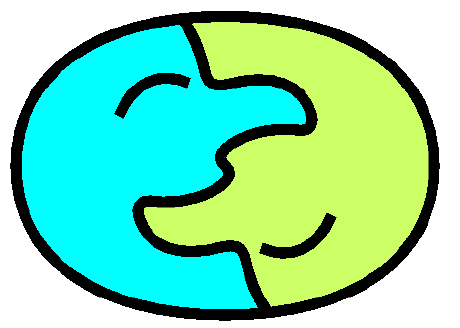The Mind Game of Table Tennis
(and it's all a mind game)
There are some things you can think about and other things that you cannot think about, if you want to perform at your best during high-pressure matches.
High Pressure
High pressure can occur when people are watching, at the US Nationals, or even when there is a bet on it. (Money is an effective way to simulate a championship match pressure.) One can put high pressure on oneself, just through routine daily anxiety and unrealistically high standards for oneself. Most people have some of this going on: it's normal. The issue is not how to avoid high pressure but how to manage it. Accepting some stress, we have to discover how to respond to it. If you have faith or are able to experience inner surrender in some way, then get in touch with that. Can you win the Olympics through the power of egotism? No, so let go a little, but also stay your ground a little, and get on top of your thinking process. You don't want to spiral downwards by thinking about the wrong things.
What you can't think about
Do not think about the points score in the game. Do not think about the games score in the match. Do not think about your being a star or a flop, winning or losing, proud or shamed. Do not think about the outcome of the match.(This instruction comes straight out of the Bhagavad Gita, by the way, where it is called being attached to the outcome - don't do it!)But you can think about winning the next, single point. How can I win this one point? You can think about that.
Do not think about stroke mechanics. Do not listen to advice about how to move your arm. That will get your conscious mind, the neocortex, involved in interfering with the sub-conscious mind, all the rest of your system. That is fine during practice, or when you're learning and your coach is showing you something. But not during a match. Let it go for now. The conscious mind needs to stay out of the way and let the rest of the system do its work.
What you can think about
You can think about energy, data, and tactical plan.
- Energy: between points, bounce on your toes, and feel
whether your system has plenty but not too much energy in it. If
you're slumping or don't have energy to bounce, then perk yourself up,
give yourself some adrenalin or some sugar: bounce! If you have too
much (nervous) energy in you, then that's great! Just recognizing that
you have too much energy can itself allow the excess to dissipated.
Or, walk around your side of the table in a circle, and do a cycle or
two of four-count breathing: breath in, counting to four, hold your
inbreath, counting to four, breath out, counting to four, hold your
outbreath, counting to four.
- Data: does your brain have the data it needs to do its automatic
brilliant job of playing the game for you? I mean, are your eyes
intently focussed on the ball? If you're not giving the system data,
it can't do a good job. So give it the data it needs, by keeping your
eyes on the ball. Watch the opponent's ball-paddle contact moment,
and watch the ball-table contact point, that's where most of the
information is. After you touch the ball, look up and watch the
opponent until they touch the ball, then watch the ball until you
touch it again, focussing especially on those two contact points.
- Tactical plan: What kind of serve are you going to
create, and where will you put it? What are you expecting for the
return and what will you do with that? Yes, you can think about your
tactics and how you are going to win this particular point. Great
players may have a tactical plan all the way through the fifth ball --
it might turn out differently, but the anticipation embodied in a
tactical plan will make you decide and move faster.
Finally, have a serve ritual that you do every time before you serve, during practice as well as during matches. Kim Taek Soo bounces the ball on his paddle with one side-spin, then the other. I bounce the ball on the table, then throw the ball at the paddle which kicks it up, bounce again once, then catch it. This puts my mind in the mode of being comfortable with what it has practiced, and of thinking about balls bouncing and rubber creating spin, instead of thinking about crowds watching, pressure, glory, or humiliation, all of which makes me play worse.
